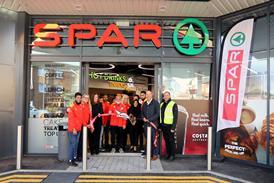East Europeans are helping to plug staff shortages in convenience stores. Amy Lanning reveals what's involved in employing migrant workers
The debate over the growing number of East European workers in the UK is an emotive one, but as Romania and Bulgaria enter the European Union, like it or not, Britain's pool of migrant workers is set to grow. When 10 nations joined the EU two years ago, the UK was one of the few countries to invite Eastern workers, and since May 2004 an estimated 600,000 East Europeans have crossed our borders.
Critics say the government has allowed too many Europeans to join the UK's workforce, with many industries complaining of wages being driven down by foreign workers willing to work for less than their British counterparts. But for a sector like convenience retailing, where recruitment and staff retention is a growing problem, eager workers from other countries have been a godsend to many retailers.
Julian Holliss, who operates three Spar stores on forecourts in Dartmouth, Devon, has employed Polish, Slovakian and Latvian workers, and is just about to recruit his first member of staff from the Czech Republic. Employing from overseas has helped to overcome recruitment problems in his stores. "We operate in a tourist location with very little unemployment, so recruiting the right people had become very difficult," he says. "Other service businesses in our area - golf club, leisure park and hotels - were filling their gaps with some success by employing foreign staff. We followed suit and have been employing foreign staff for two full years now and have learnt a lot in that time."
Julian says staff from overseas have replaced the 'pay day' type of fringe employee previously employed in his stores. "Foreign staff have raised the productivity levels of all our employees. Basic problems that we used to experience such as cleanliness, litter, merchandising standards, unwillingness to work unsociable hours and covering staff shortages no longer seem to be a continual test of our own time and reserve."
"Customer perception can be that you employ for financial reasons, but this definitely isn't the case," adds Julian. "Value for money is a key factor and we have foreign staff whom we pay in excess of national minimum wage."
Julian provides his overseas staff with rented accommodation, a responsibility that has brought challenges he doesn't face when employing English staff, but he adds: "We're always conscious to balance the negatives and positives."
While many retailers like Julian have had positive experiences from employing overseas staff, it's a recruitment process that has its own share of red tape. It is a criminal offence for any business to employ someone who has no right to work in the UK, or no right to do the work you're offering, and it's up to the employer to check out a candidate before they recruit them.
Ray Silverstein, partner in employment law firm Browne Jacobson, says: "To protect itself from committing a criminal offence and being fined up to £5,000 per illegal employee, every c-store is advised to obtain the original and a copy of various documents from a set list. Originals and copies are to be compared and the copies kept safe by the employer. Employers are not required to become experts in identifying false documents, but will not be protected if the forgery is obvious. No offence will be committed if the worker turns out to be an illegal worker so long as the proper checks were made. The same rules should be applied to every job applicant to avoid claims of discrimination and/or unfair dismissal."
Workers from some EU countries need to be registered to work in the UK. The Worker Registration Scheme was set up by the government to monitor the participation of workers from eight of the 10 countries that joined the European Economic Area in May 2004 - Czech Republic, Estonia, Hungary, Latvia, Lithuania, Poland, Slovakia and Slovenia. Employers have the responsibility to ensure that a person from one of these eight countries registers with the Home Office, unless they are exempt. Check www.employingmigrantworkers.org.uk to find out who could be exempt.
The government has also put restrictions on Romanian and Bulgarian workers and most will not be eligible to work in convenience stores. Lower-skilled workers will be able to work only in the food processing and agricultural sectors, but the skilled can work if they get a permit, are a student, or are self-employed. On-the-spot fines of £1,000 and penalties of up to £5,000 for employers are in place to penalise law-breaking.
But don't let the red tape put you off - Julian says that any red tape involved in employing foreign staff is no worse than that for recruiting British employees. "A foreign employee must be treated exactly the same as an English employee - same contract, job description, terms and conditions and so on. The Worker Registration Scheme is flawed because the self-employed do not need to register, but for our purpose it is easy to use.
"We have the forms and request that all employees fill them in upon arrival and provide us with the registration fee of £70, and we then complete our section and send it off."
On some of these websites, such as Baltic Recruitment Services (www.balticrecruitment.co.uk), you can post your job vacancies for free and the agency will match the right candidate for your business. Another agency, Otto Workforce (www.ottoworkforce.co.uk), conducts what it calls a Culture Fit Test, which helps to ensure it recruits the right people for the right jobs. The series of tests reveal a candidate's suitability for a position, as well as other attributes such as motivation, ability to be a team player, personal hygiene, time-keeping and attitude.
Independent retailer Julian Holliss, who employs staff from Poland, Latvia, Slovakia and the Czech Republic, uses an agency to recruit foreign students. "These students are usually looking to take a gap period of six to 12 months from their studies to earn money to finance their education," he explains. "The agency we use charges the foreign employee for the placement and not the employer. Most agencies charge the employer for this service."
The agency emails Julian a CV and photo, plus their English level score. "Then we make a decision," he says. "The process of filling a position is usually complete within 14 days, which we find quicker than recruiting locally. Advertising in the weekly rag, plus interview and notice to be given usually takes three or four weeks.
"We have also employed relatives and friends of foreign employees," adds Julian. "If the employee is settled and working well, it makes sense for them to bring people who will enhance that situation and, to a degree, it takes the unknown out of the equation."
The agency stipulates that Julian provides accommodation, pays minimum wage and registers the workers.
The debate over the growing number of East European workers in the UK is an emotive one, but as Romania and Bulgaria enter the European Union, like it or not, Britain's pool of migrant workers is set to grow. When 10 nations joined the EU two years ago, the UK was one of the few countries to invite Eastern workers, and since May 2004 an estimated 600,000 East Europeans have crossed our borders.
Critics say the government has allowed too many Europeans to join the UK's workforce, with many industries complaining of wages being driven down by foreign workers willing to work for less than their British counterparts. But for a sector like convenience retailing, where recruitment and staff retention is a growing problem, eager workers from other countries have been a godsend to many retailers.
Julian Holliss, who operates three Spar stores on forecourts in Dartmouth, Devon, has employed Polish, Slovakian and Latvian workers, and is just about to recruit his first member of staff from the Czech Republic. Employing from overseas has helped to overcome recruitment problems in his stores. "We operate in a tourist location with very little unemployment, so recruiting the right people had become very difficult," he says. "Other service businesses in our area - golf club, leisure park and hotels - were filling their gaps with some success by employing foreign staff. We followed suit and have been employing foreign staff for two full years now and have learnt a lot in that time."
Julian says staff from overseas have replaced the 'pay day' type of fringe employee previously employed in his stores. "Foreign staff have raised the productivity levels of all our employees. Basic problems that we used to experience such as cleanliness, litter, merchandising standards, unwillingness to work unsociable hours and covering staff shortages no longer seem to be a continual test of our own time and reserve."
Highs and Lows
Julian believes employing foreign staff has had a positive impact on his business, but admits there are a few disadvantages. "Communication can be a problem, especially when staff have just arrived and aren't familiar with the area, store, stock, business and so on. We have foreign employees who speak no English and those who are fluent."Customer perception can be that you employ for financial reasons, but this definitely isn't the case," adds Julian. "Value for money is a key factor and we have foreign staff whom we pay in excess of national minimum wage."
Julian provides his overseas staff with rented accommodation, a responsibility that has brought challenges he doesn't face when employing English staff, but he adds: "We're always conscious to balance the negatives and positives."
While many retailers like Julian have had positive experiences from employing overseas staff, it's a recruitment process that has its own share of red tape. It is a criminal offence for any business to employ someone who has no right to work in the UK, or no right to do the work you're offering, and it's up to the employer to check out a candidate before they recruit them.
Ray Silverstein, partner in employment law firm Browne Jacobson, says: "To protect itself from committing a criminal offence and being fined up to £5,000 per illegal employee, every c-store is advised to obtain the original and a copy of various documents from a set list. Originals and copies are to be compared and the copies kept safe by the employer. Employers are not required to become experts in identifying false documents, but will not be protected if the forgery is obvious. No offence will be committed if the worker turns out to be an illegal worker so long as the proper checks were made. The same rules should be applied to every job applicant to avoid claims of discrimination and/or unfair dismissal."
Good advice
The Employing Migrant Workers website (www.employingmigrantworkers.org.uk) has a step-by-step compliance guide that takes employers through all the checks that are needed to ensure a person is legally allowed to work in the UK. Doing so will also give employers a statutory defence in the event that they unknowingly employ someone illegally.Workers from some EU countries need to be registered to work in the UK. The Worker Registration Scheme was set up by the government to monitor the participation of workers from eight of the 10 countries that joined the European Economic Area in May 2004 - Czech Republic, Estonia, Hungary, Latvia, Lithuania, Poland, Slovakia and Slovenia. Employers have the responsibility to ensure that a person from one of these eight countries registers with the Home Office, unless they are exempt. Check www.employingmigrantworkers.org.uk to find out who could be exempt.
The government has also put restrictions on Romanian and Bulgarian workers and most will not be eligible to work in convenience stores. Lower-skilled workers will be able to work only in the food processing and agricultural sectors, but the skilled can work if they get a permit, are a student, or are self-employed. On-the-spot fines of £1,000 and penalties of up to £5,000 for employers are in place to penalise law-breaking.
But don't let the red tape put you off - Julian says that any red tape involved in employing foreign staff is no worse than that for recruiting British employees. "A foreign employee must be treated exactly the same as an English employee - same contract, job description, terms and conditions and so on. The Worker Registration Scheme is flawed because the self-employed do not need to register, but for our purpose it is easy to use.
"We have the forms and request that all employees fill them in upon arrival and provide us with the registration fee of £70, and we then complete our section and send it off."
Useful websites
www.employingmigrantworkers.org.uk
www.workingintheuk.gov.uk
www.businesslink.gov.uk
Where to find overseas staff
East and Central Europeans have settled all over the UK, so the chances are you could recruit someone through your normal channels. But a quick search on the internet will introduce you to a number of recruitment agencies that specialise in providing Eastern and Central European workers to UK companies.On some of these websites, such as Baltic Recruitment Services (www.balticrecruitment.co.uk), you can post your job vacancies for free and the agency will match the right candidate for your business. Another agency, Otto Workforce (www.ottoworkforce.co.uk), conducts what it calls a Culture Fit Test, which helps to ensure it recruits the right people for the right jobs. The series of tests reveal a candidate's suitability for a position, as well as other attributes such as motivation, ability to be a team player, personal hygiene, time-keeping and attitude.
Independent retailer Julian Holliss, who employs staff from Poland, Latvia, Slovakia and the Czech Republic, uses an agency to recruit foreign students. "These students are usually looking to take a gap period of six to 12 months from their studies to earn money to finance their education," he explains. "The agency we use charges the foreign employee for the placement and not the employer. Most agencies charge the employer for this service."
The agency emails Julian a CV and photo, plus their English level score. "Then we make a decision," he says. "The process of filling a position is usually complete within 14 days, which we find quicker than recruiting locally. Advertising in the weekly rag, plus interview and notice to be given usually takes three or four weeks.
"We have also employed relatives and friends of foreign employees," adds Julian. "If the employee is settled and working well, it makes sense for them to bring people who will enhance that situation and, to a degree, it takes the unknown out of the equation."
The agency stipulates that Julian provides accommodation, pays minimum wage and registers the workers.

















No comments yet